How to create a photography portfolio website

- How to make a photography portfolio online
- Choose a website builder
- Choose a template
- Customize the photography website template
- Make sure you've created a good online photography portfolio
- Publish your photography portfolio website
- How to use a photography portfolio website to get more clients
- Social media and stock photography websites
- Freelance marketplaces
- Advertising
- Competitions and exhibitions
- Be active when searching for clients
- Creating a photography portfolio website: FAQ
- Should I make a photography portfolio website?
- Does a photographer's portfolio have to be a website?
- Where can I create a photography portfolio?
- How do I make a photography portfolio without clients?
- How many images should be in your online portfolio?
- How to choose a photo for your photography portfolio website?
- The bottom line
Use a drag-and-drop website builder to create your online photography portfolio. You don’t need to understand site coding or designing to use it. Just choose what you want to add to your website.
Here is an example of a photography portfolio website created in one of such builders using a template. If you like it, you can use the same template. It's available after a quick sign-up.
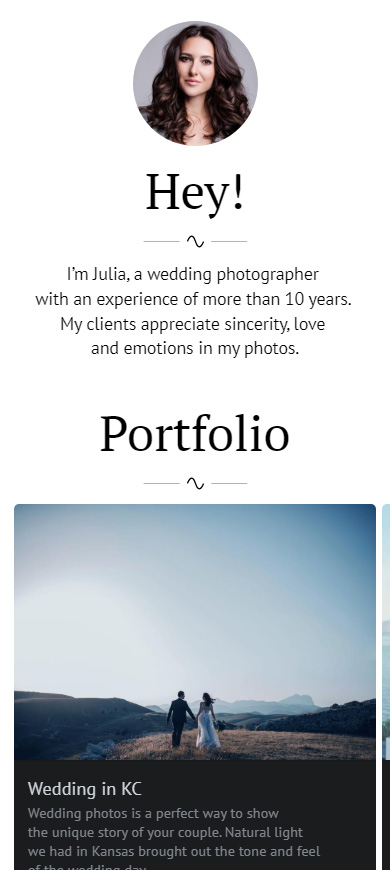
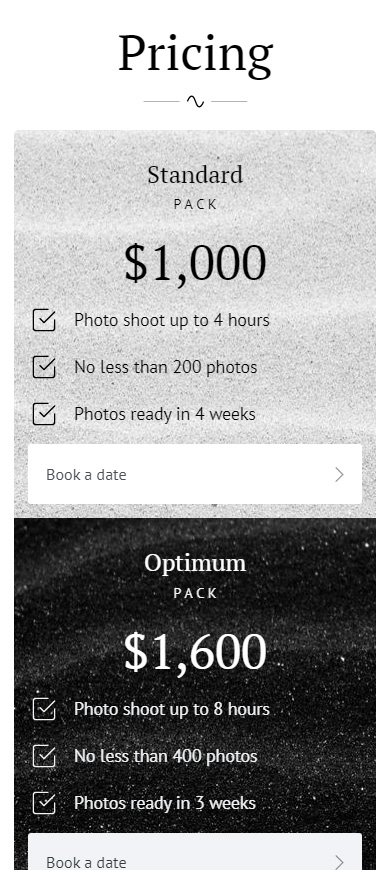

This is the online portfolio we use to illustrate the step-by-step instruction below. All in all, it takes less than 20 minutes.
The variety of website builders is bewildering. Each of them has dozens of features and benefits. But the most important things for creating a photography portfolio online are:
- Mobile-first design. People use their phones to surf the internet more and more often. If your photography portfolio is created in a mobile-first website builder, then it will be loaded instantly and displayed correctly on their phones. Probably you are using your phone to read this now. So, you will appreciate the editor interface in such builders, because it is designed specifically for working from smartphones.
- Variety of elements to add to a page. Make sure that the website builder allows you to add a description of your photography services, a gallery of works, a price list, backstage videos, and a form or button that lets them book a date. Then, your online portfolio will be illustrative and will be a help in turning your prospects into buyers.
- Price. Probably, the price is a matter only until you find clients. But it is important to make sure that you can pay for the chosen plan until then. If you have no budget, choose a website builder providing a free plan. You usually have fewer features on it but still can create a photography portfolio website.
Taplink is the most cost-effective option. This is a mobile-first website builder that provides a variety of tools that fully justify its prices. There is also a free plan. Taplink is the builder we use in the instructions to create an example of a photography portfolio website.
First of all, sign up on Taplink to create a website for your photography portfolio.
After registration, you will be taken to the page with templates for various industries.
- Switch to the Lite website tab.
- Type a word related to photography in the search bar, like "photo" or "photographer".
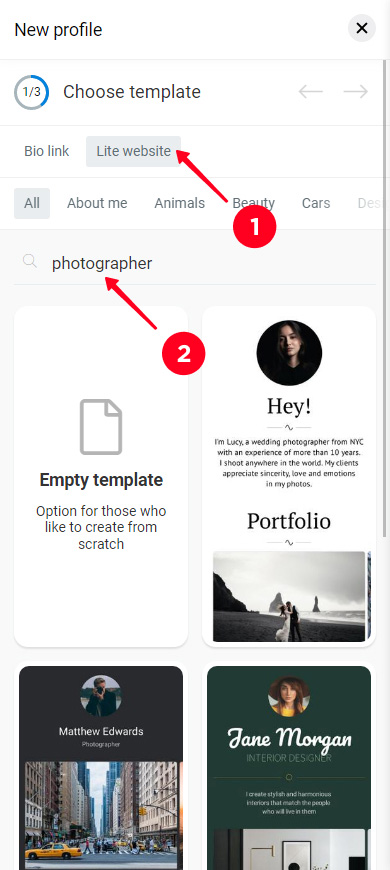
You will be offered website templates for photographers that are suitable for creating a portfolio. Choose the one you like:
- Tap a template.
- Scroll through the template to make sure it suits you. Tap Choose.

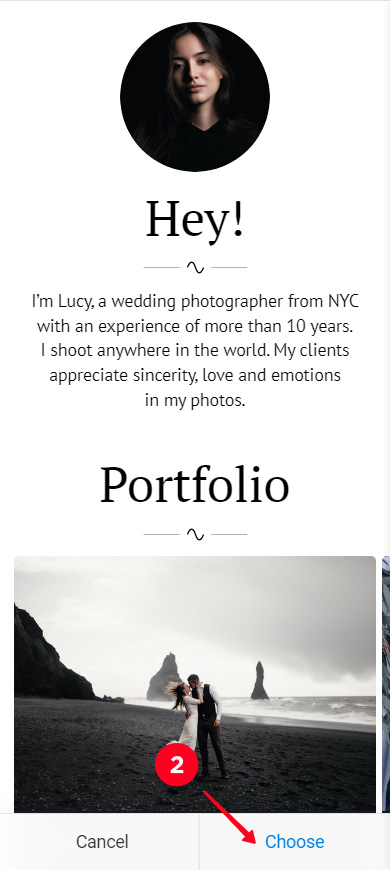
Great, you’ve chosen a template for your photography portfolio. Now, let’s customize it.
Make the photography website into an online portfolio that tells about you. It consists of blocks that you can edit. You can also add, remove and move blocks.
Available blocks depend on your paid plan. If a block on the page is translucent, like in the screenshot below, then it is not available on your plan. Upgrade your plan to use it.
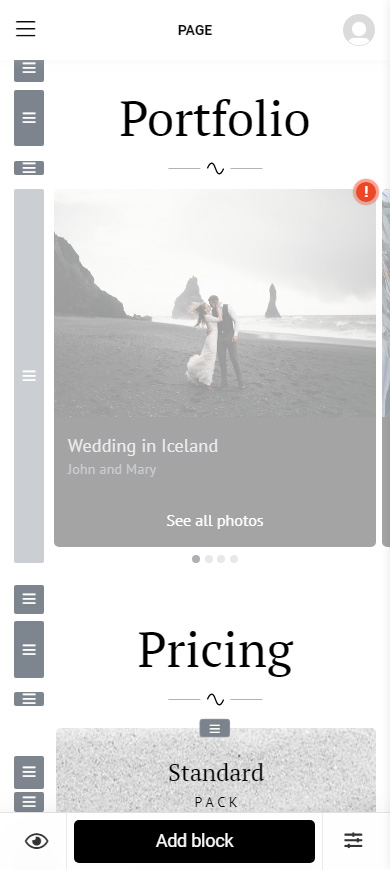
You don’t have to pay for a paid plan before you make sure its price is reasonable for you. Taplink provides a 7-day trial. All blocks are available for free during this time, so you can try each and decide which you want in your photography portfolio. Go to the pricing page to start the trial.
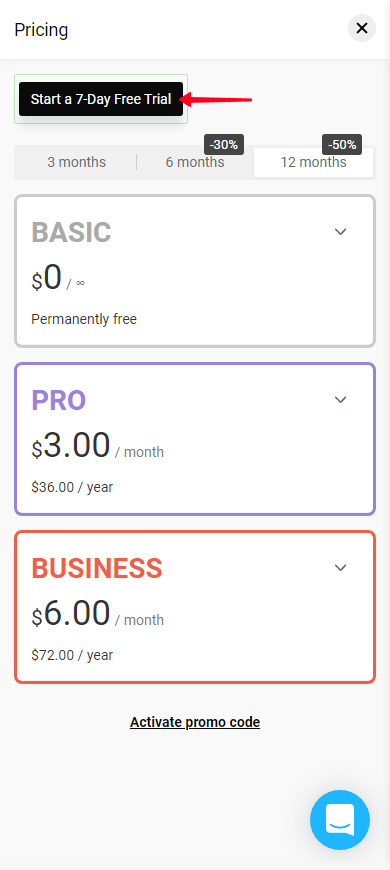
Edit the blocks so that the portfolio website tells users about your photography skills and services. Set your profile picture, change the text, upload your photos, and add your links.
Pay attention to blocks with exclamation marks. They must be edited.
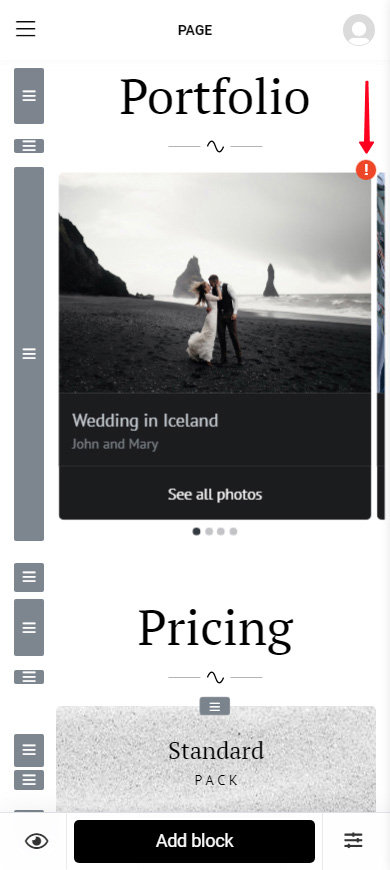
All blocks on your photography website are edited similarly. You need to tap one, change the info in the fields or upload files. We will give an example with a photo carousel.
01. Tap a block.
02. Tap the upload icon and select the file on your device.
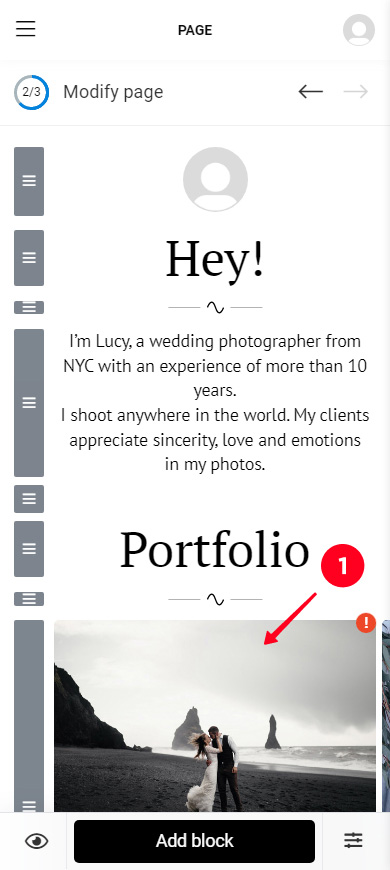
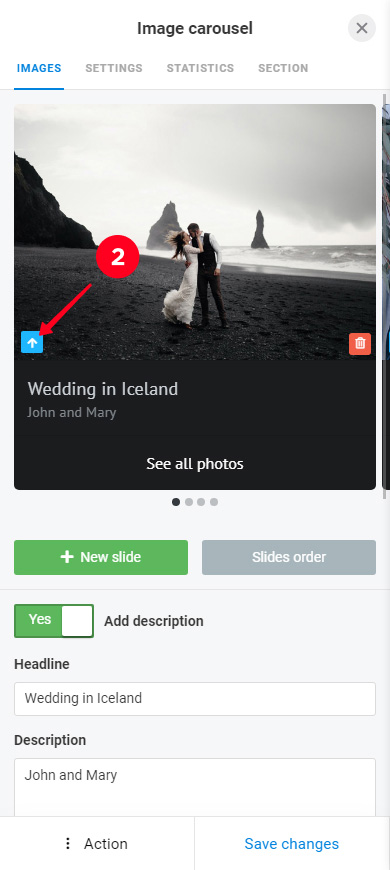
03. Fill in the title and description fields for this slide.
04. Specify the button text and the link for this slide. For example, direct users to book a date or see the rest of the album.
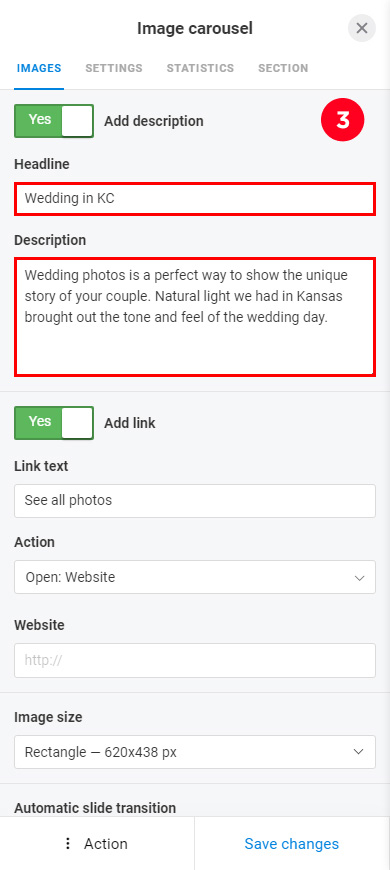
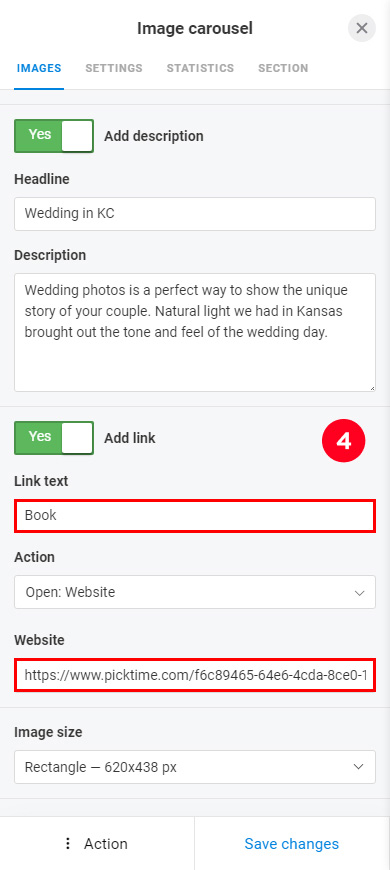
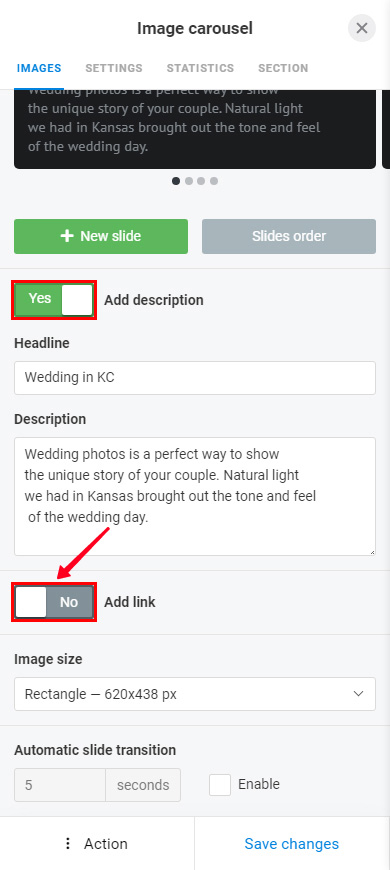
05. Edit the rest of the slides. You can switch between them by swiping through them, or by tapping the dots under them. Repeat steps 2–4 for each slide.
06. Optionally, add a new photo slide by tapping + New slide. After adding, follow steps 2–4.
07. Tap Save changes.

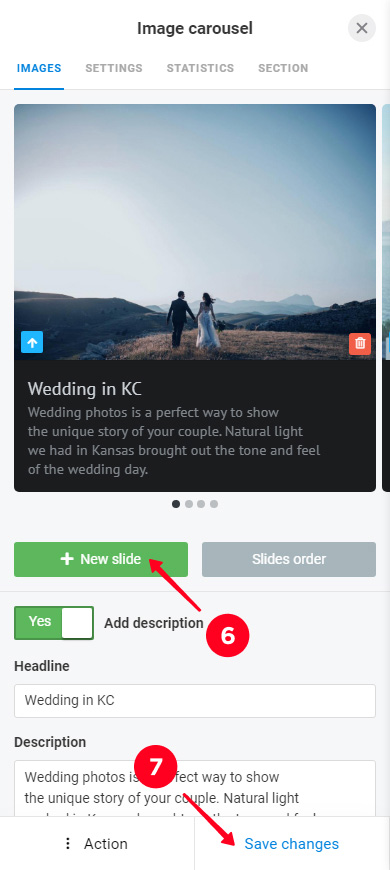
Edit the rest of the blocks on your photography portfolio website in the same way.
You can add more blocks to your online photography portfolio. For example, if you want to create a website with multiple photo galleries, or add links to your profiles on websites like Behance or DeviantArt.
Taplink has 18 blocks in total, and each of them helps you to present yourself.

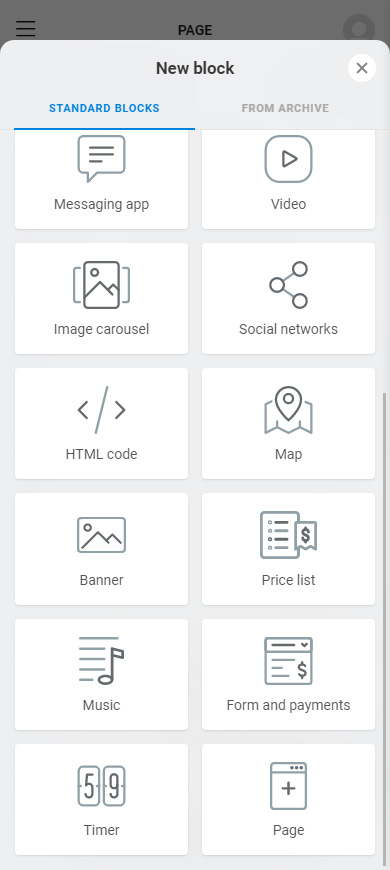
Here are just some examples of how a photographer can use them to create a photography portfolio website:
- FAQ. Add a drop-down list to answer frequently asked questions or tell your clients about booking terms and time, payment, studio rental, and shooting terms.
- Media and text. A few short texts with attached pictures may tell your clients what’s included in the price, or it may show customer testimonials.
- Forms and payments. These are opt-in forms and a button that directs users to the payment processor's page. They let users book a date and pay for a photo shoot here and now while they are impressed with your photos.
All blocks are added to your photography website similarly. Below, we give instructions, adding a Media and text block to our online portfolio as an example. We show customer testimonials in it:
- Tap Add block.
- Select Media and text.
- Fill in the fields. Tap the photo field to select an icon or upload your image. Write the name of a person in the Headline field and add a testimonial in the Text field.
- Tap + Add new item to add another testimonial.
- Tap Save changes.


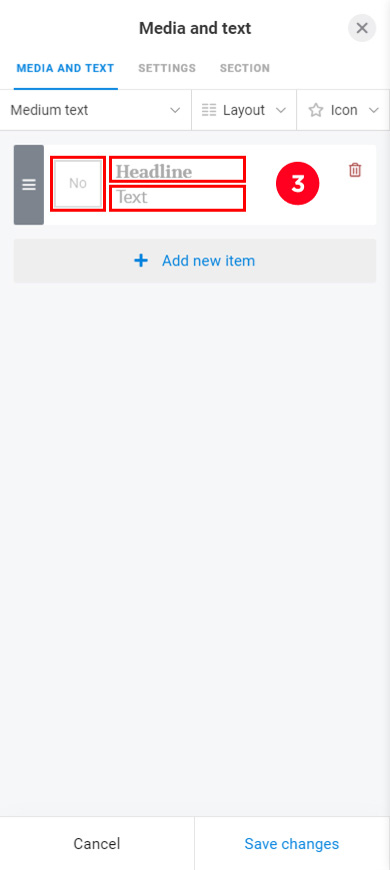

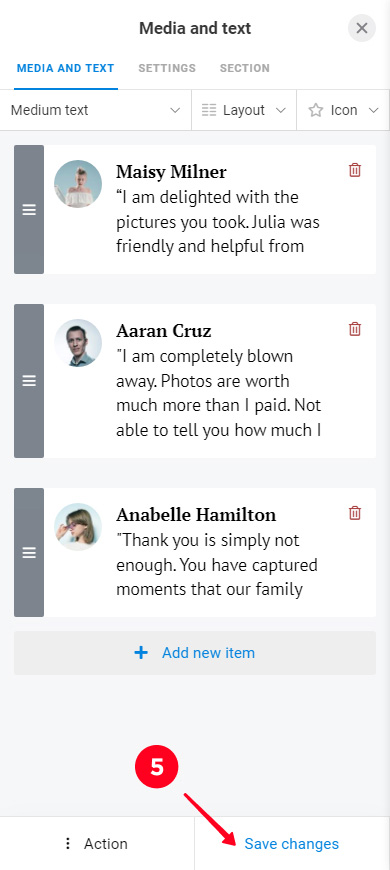
That’s it, we figured out how to add new blocks to your online photography portfolio in the website builder. Just a few more points to be figured out.
You can move blocks on your photography portfolio website. Tap the rectangle with three lines next to the block you want to move, drag it to where you want it, then release.
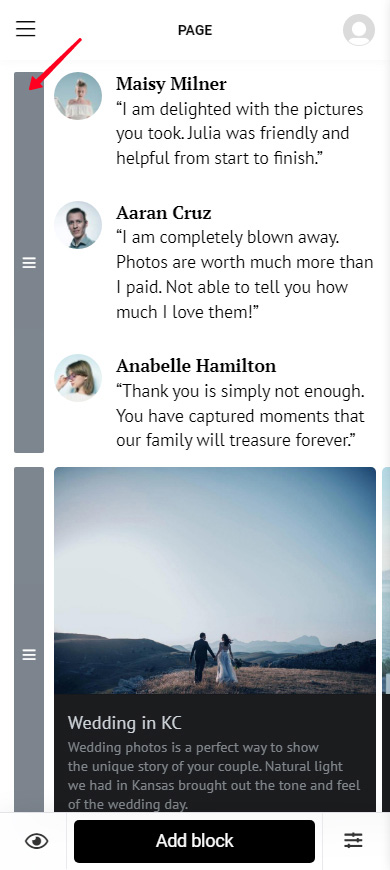
Any block on your photography portfolio website can be deleted. Let's say, you don’t want people to call you, you want to chat with the clients in messaging apps only. Then, remove the call button from your website.
A block can be deleted this way:
- Tap the block.
- Tap the Action menu.
- Select Delete.
- Click Delete again.
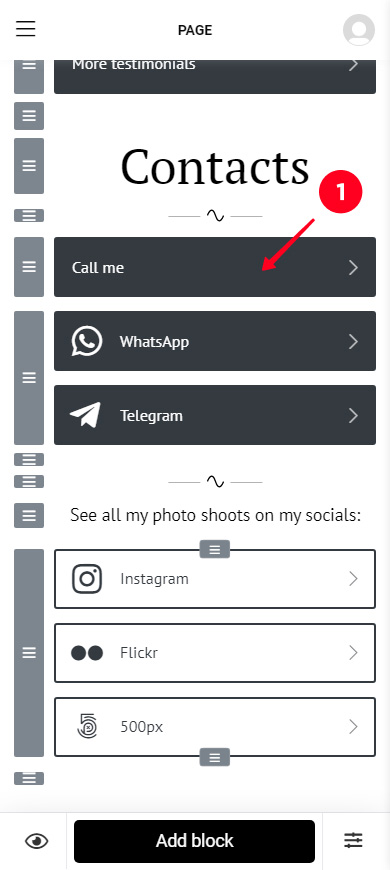
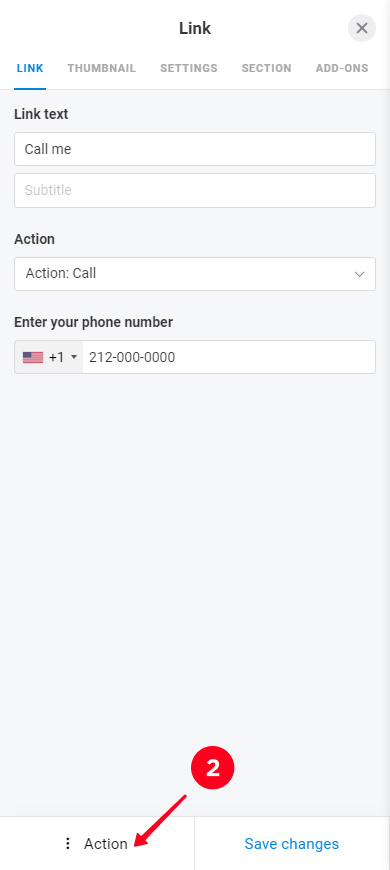
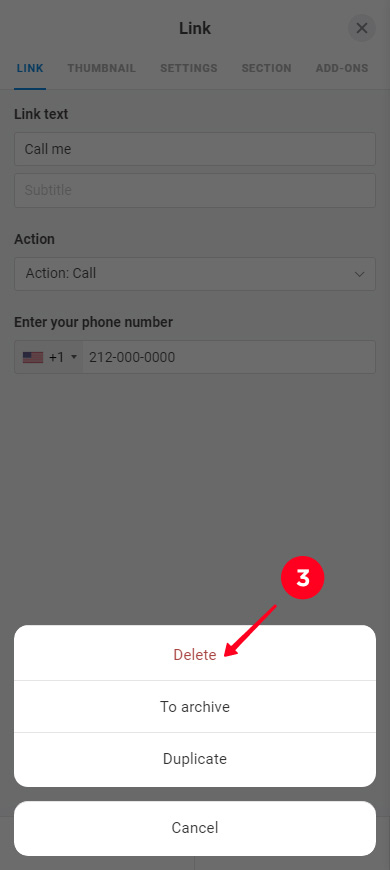

Look through your photography portfolio website from the beginning to the end. Check if all the blocks with exclamation marks have been edited. Make sure you have updated the prices, terms and conditions, examples of work and text, links for booking and contacting, and now they are relevant to you.
Congratulations! You have created your photography portfolio website. Before presenting it to your potential clients, let's make sure it can persuade them to book a shoot.
Check your photography website, it should include:
- your photo or logo at the very top;
- your description at the top that says you are a photographer;
- clear offer above the fold;
- a call to action and a link next to it that enables users to take this action;
- examples of your work;
- shooting terms and conditions including the duration and cost;
- links to your accounts on photography websites and social networks.
When your photography portfolio website is created, get the link to share it online:
- Tap continue to publish the page.
- Complete the URL of your page. We recommend using your username on social networks or your real first and last names.
- Tap Connect.
- Tap Copy link.

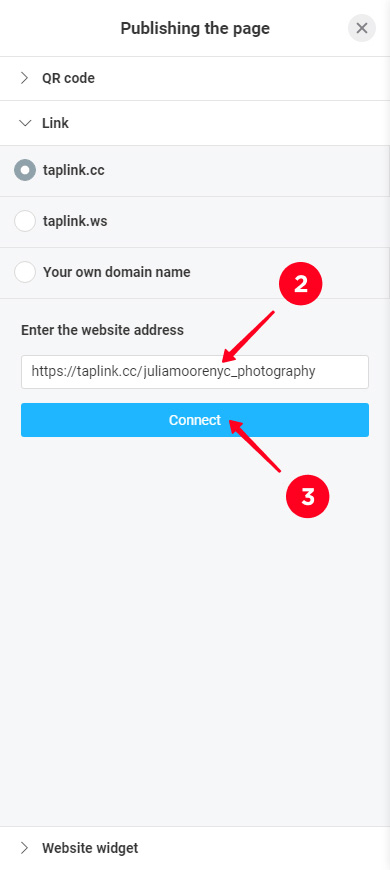
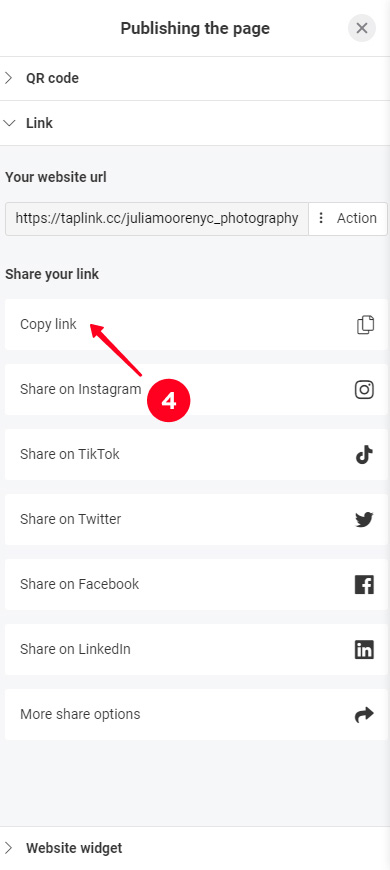
That's all, your photography portfolio website is ready. In the screenshots you can see the online portfolio we created for this article, follow the link to see the full page.
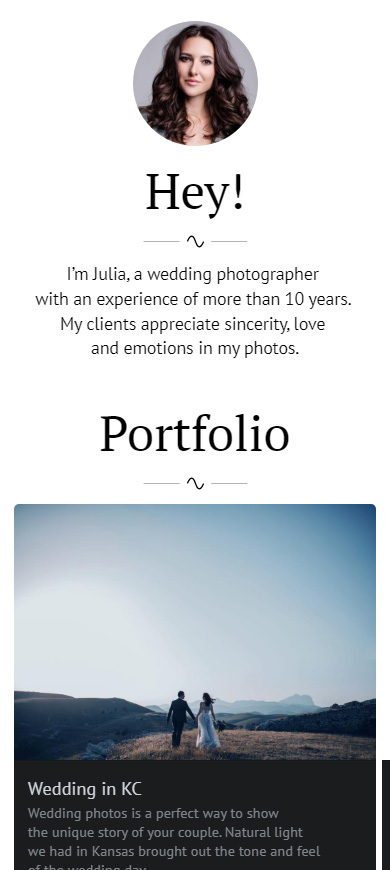
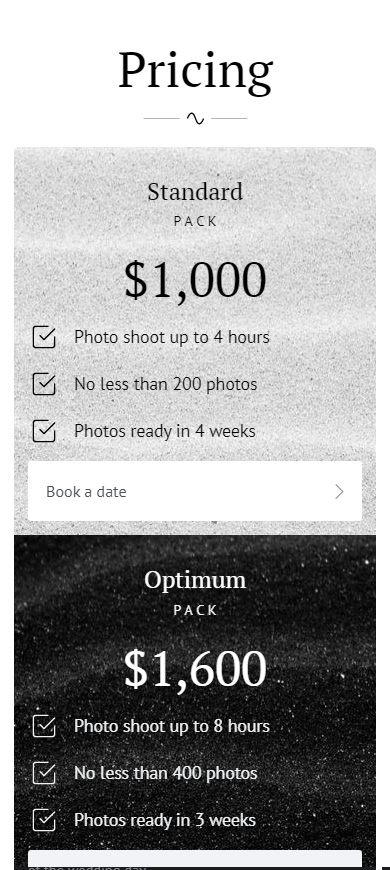
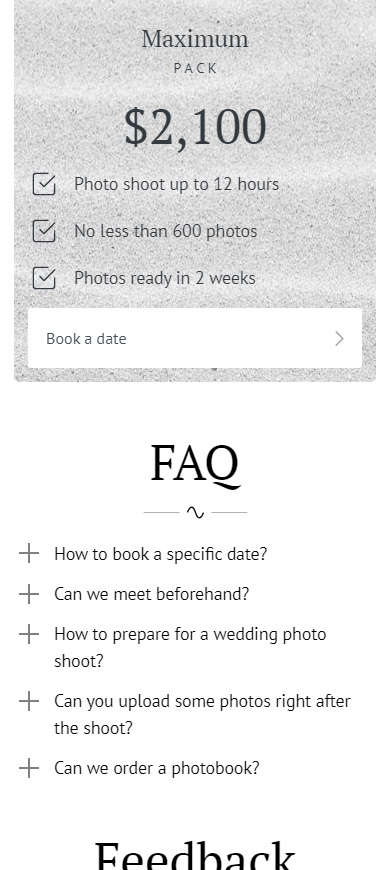
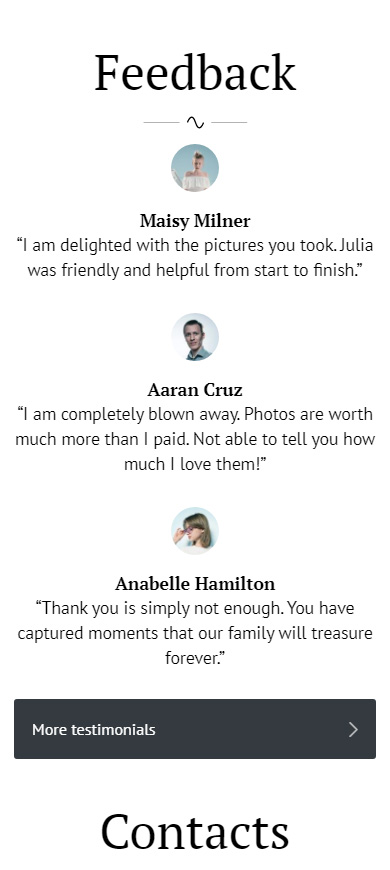
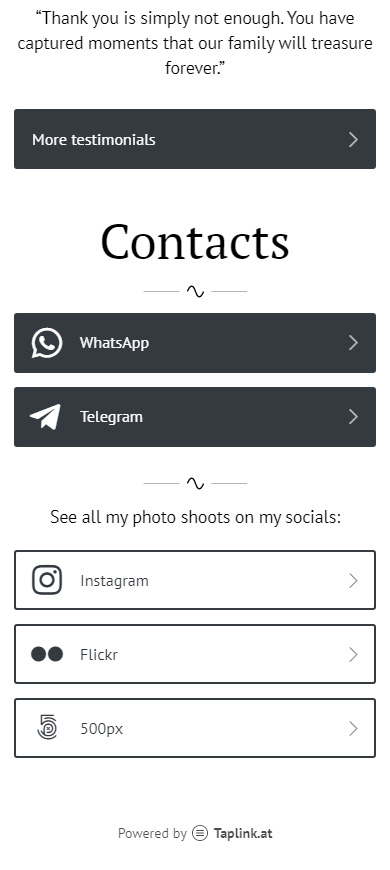
Next, we will tell you how to use the photography portfolio website you created to get more clients. Then, we will answer questions that photographers ask most frequently.
Now you've got a photography portfolio. You need your potential clients to see it. We suggest several ways to show it to them.
Share your online portfolio in your social media accounts and stock photography websites. As you promote your accounts, more people know about you. And there will definitely be those who want a photo session among them. The link will lead them to your portfolio website, where they can see your offer and book a date.
You can invite people to view your photography portfolio and book a date online in your bio and posts:
- Bio. Your photography Instagram bio is one of the first things a user sees when they visit your page. So they will definitely notice the link there. Add a call to action to the text to make them tap the link.
Below you can see examples of what a link to a photography portfolio made on Taplink looks like in a profile bio on Instagram, Pinterest, and Flickr.
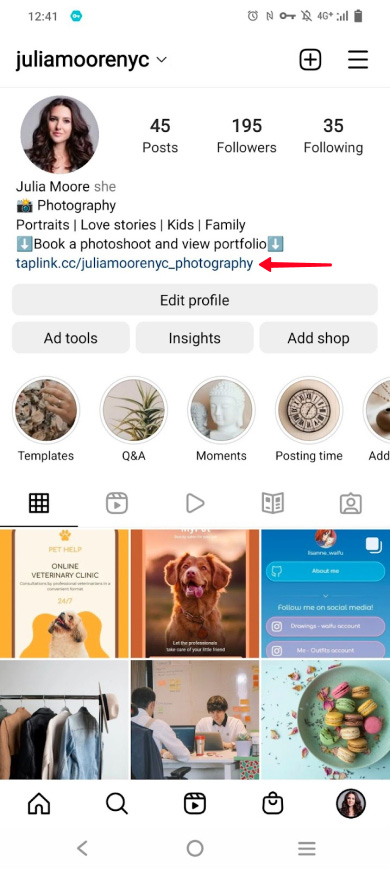

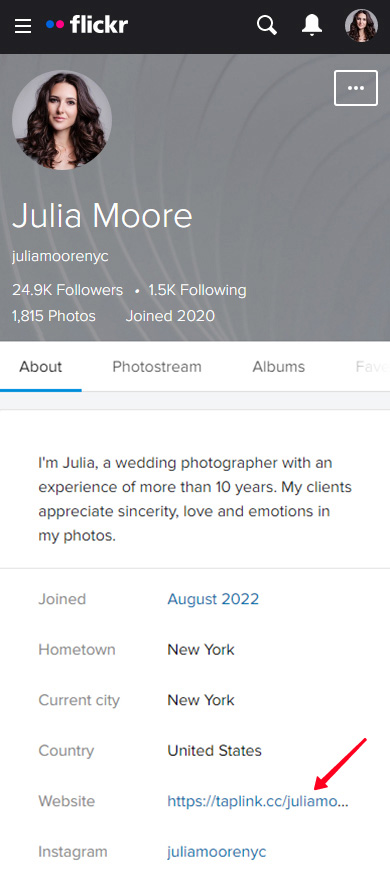
- Posts. If you promote your photography business on Instagram, add the link to your photography portfolio in Stories regularly, write captions for your photo posts inviting users to follow the link in your bio. On Pinterest, add the link when posting Pins. On Unsplash, add the link under your photos. You can use the link on other sites too.
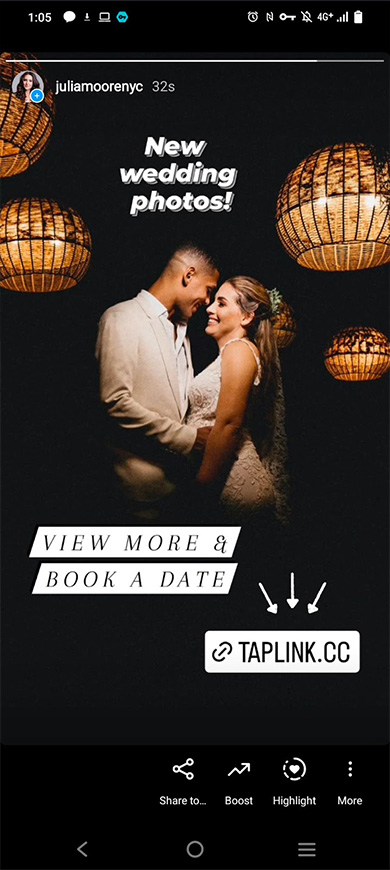
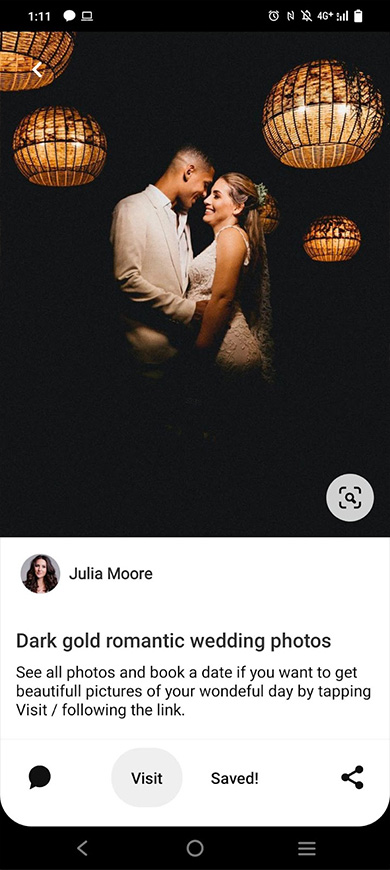
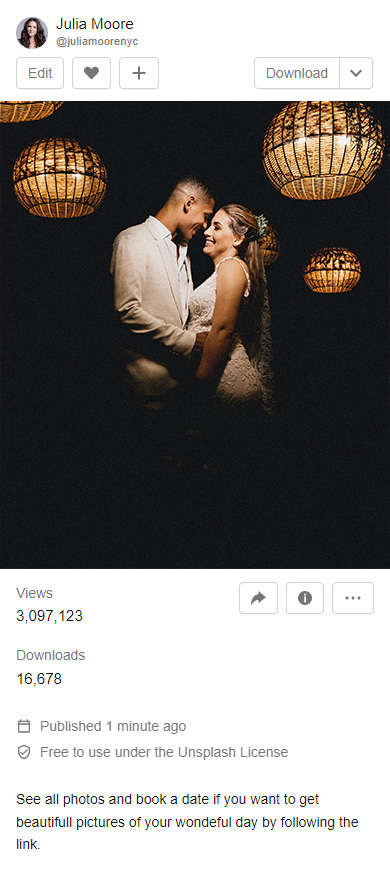
You can also ask your clients to link to your photography portfolio when they share your photos. For example, you were a photographer at a wedding. If the couple have made a wedding website and added the event photos there, they can also add your photography portfolio link under the photos.
On freelance marketplaces, your photography portfolio simplifies communication with clients. Instead of telling them about your skills and sending examples of your work, just link to your portfolio website. Do it when you:
- post a proposal. Then, a model or brand can view the online portfolio to understand what you can do and how much you take for it. This will allow them to quickly understand whether you are the photographer to hire;
- apply for a project or proposal. A good portfolio attached to the appliance can make you stand out from your competitors, and you will get the job.
Launch advertising to find clients faster. Of course, this requires some financial investment, but it will pay off in the end. Direct users from ads to the photography portfolio website you created. If you made the portfolio according to our instructions, it has everything to persuade an interested user to book a photo shoot.
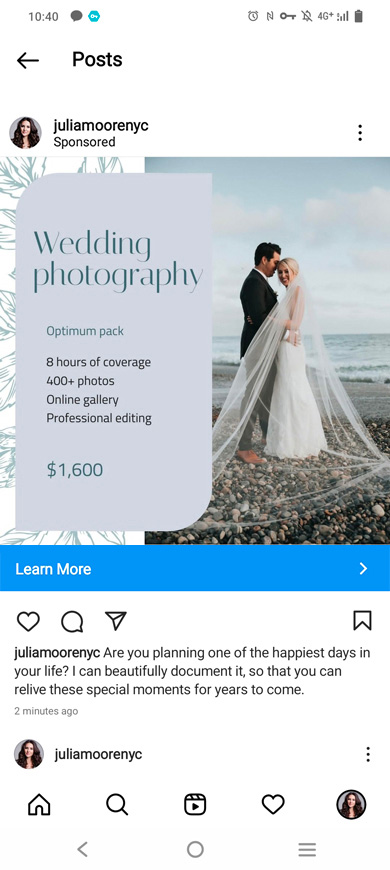
Competitions and exhibitions are a good opportunity to promote yourself as a photographer. Add your username and your portfolio's QR code under the exhibiting photos. Also, add the name and the code to your business cards and hand them out to the visitors. This way people can view your portfolio to learn more about you and book a date.

Don't wait for clients to find you, find them yourself. Text, call, or come in person to them. The photography portfolio you created will be helpful here too.
Offer your photography services to:
- Brands. Whatever a brand sells, it needs a good presentation. And photos are a great way to show the product.
- Models and modeling agencies. They need a portfolio with beautiful photos to find customers as much as you.
- Newspapers and magazines. They constantly need new content, photos in particular. Try applying for a freelance photography job, you have a fighting chance to be hired. Even if you haven’t got a photo of Spiderman yet :)
- Event agencies. Their clients always claim photos of the event they had. After all, if you haven’t posted a party photo on Instagram, then you haven’t partied. Therefore, each event agency needs a photographer who can take Instagrammable photos.
Give potential clients the link to your photography portfolio website or its QR code. Then, they can review your offer at their convenience and reach out to you when they need your services.
You already know how to create a good photography portfolio website and how to use it to attract clients. If you still have questions, you may find the answers to them in this section.
Yes, every photographer needs a portfolio. It will explain your offer to clients briefly and clearly. And those who’ll get interested will be able to contact you. See a step-by-step instruction on how to create a photography portfolio website above.
No, but we recommend that you create a website for your photography portfolio that can be shared online. It has advantages over a physical or digital one.
A website portfolio is:
- more illustrative and persuasive. You can add media files, text, links, animations, set display time for elements, and much more!
- easy-to-share. You can place a link to your photography website in your social accounts and send it in messages, and comments. Thanks to this, anyone can view your online portfolio at any time of the day or night, even if they are halfway around the world;
- editable. You can change your online portfolio at any time. You only need to go to the builder’s website and edit it. The changes will be displayed on your portfolio page at the same moment.
The most convenient way to create a photography portfolio is to do it online using a website builder. For example, on Taplink. This is a drag-and-drop builder, so you don't need to understand how websites are designed. In addition, there are website templates made specifically for photographers.

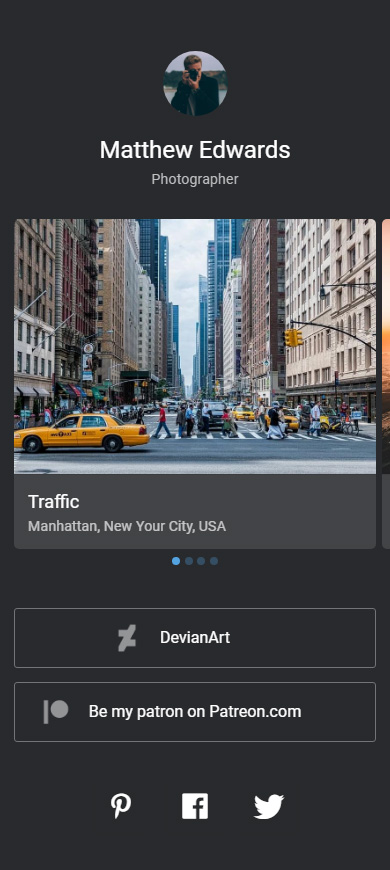

Follow the links to view the full portfolios made with templates:
Read where to get a photography website template and how to make an online portfolio from it above.
When a beginner photographer is creating their portfolio, they get into a vicious circle. They need to add photos to their portfolio in order to find clients. But they need to find clients first to get photos they could add. Here are some ideas of what to add if there is nothing to show yet.
You definitely have something to show in your photography portfolio. For instance, you have photos on your social profiles. In addition, you’ve taken pictures while you were training to photograph. The latest photos must be good enough since you decide to start a career in photography.
Add your best shots to your photography portfolio website, even if they are not relevant to the niche you want to develop in. Your task at this point is to show that you have your own style and keep the horizon line straight. These will be enough to find the first clients.
Opportunities to take your first shots for a photography portfolio are everywhere! Choose what’s good for your niche.
- People. Your friends and family members will surely give you a hand if you ask them to pose in front of the camera. Besides, you can take pictures of people on the street, in most countries it is not prohibited by the law.
- Architecture or nature. Take a walk around the city or in the nearest forest with a camera. There are a lot of buildings and trees to photograph.
- Goods and food. You can take pictures of literally anything you see. For example, you can photograph a porcelain coffee set at home or a coffee cup with a croissant in a café.
- Events. Attend city events and take pictures there. Family reunions and hangouts with friends are also great for taking pictures for your portfolio.
You will get the first photos for your photography portfolio website quicker if you offer people to photograph them for free. They will be more willing to accept your offer if they don't have to pay. Look for TFP models, brands that need to shoot a product, or clients on a budget. You can:
- find them in the relevant Facebook publics, Instagram accounts, or by tags in these and other social networks;
- offer a photo shoot to a new local brand;
- collaborate with make-up artists, hairdressers, manicurists, etc;
- post an offer for a free photo shoot on your social profiles;
- find brands on freelance websites and offer free photo shoots to them;
- offer to assist as a second photographer, and take additional photos or shoot backstage.
Recommendations for a photography portfolio vary from 10 for the entire website to 30 for one gallery. To find the best number, keep reasonable limits.
Add all your photos that may catch users. Use pictures from different photo shoots. Show those made in different locations, showing different people, and conveying different vibes. This way you will get more people interested.
But don't bore users with too many photos in your photography portfolio. Few will look through all of them. In addition, after viewing one large gallery, a user may not want to view the next one, even if it is absolutely different. Catching pictures may be unnoticed.
Add only the best shots when creating your online photography portfolio and be reasonable when choosing them. Here are three main tips on how to pick photos:
- ask friends and family members, post a vote on social networks. A view from the side lets you make up a more objective opinion about your photos;
- check statistics of photos you've posted. Choose those that have got more likes on social networks and those that have been downloaded more times on stock photography websites;
- add unique photos. You have to decide which photo is better: where a model raises her right hand or where she raises her left hand, and add only this photo to your portfolio. A similar photo does not tell users more or give a better understanding of your skills and style, it only takes precious users’ time.
You can create a photography portfolio online with a website builder. It allows you to state your photo shoot terms and show examples of work. You can also add an action button so that users can book a date right after viewing your portfolio, while they are under the impression. In the instructions, we build the website on Taplink.
Don't forget to update your photography portfolio. Add relevant and up-to-date information to your website, and replace old photos with new better shots regularly.